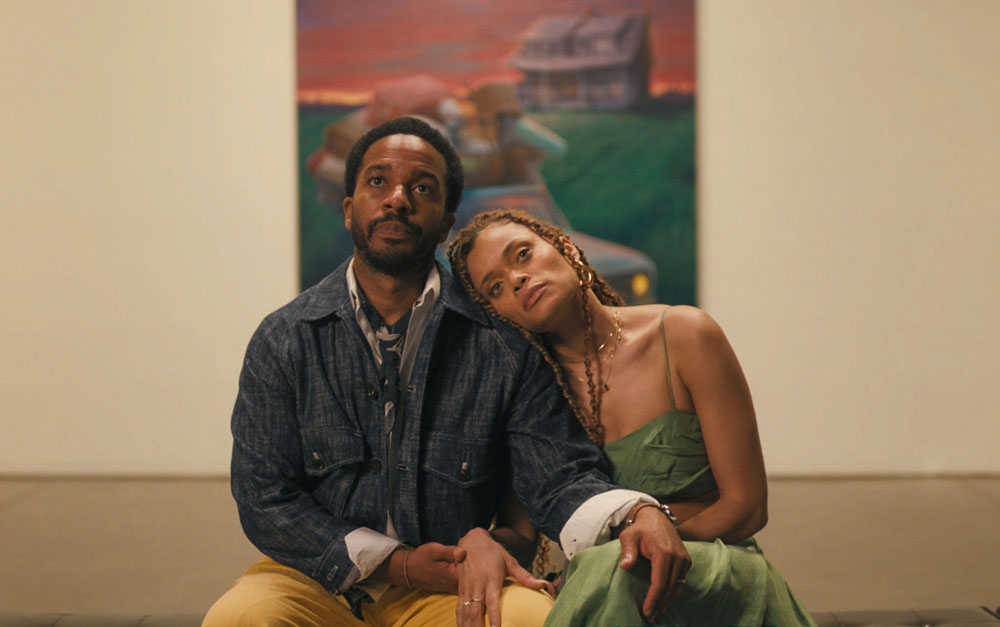“You see my song?” Aisha (Andra Day) asks Tarrell (Andre Holland), practicing a ballad she’s been working on for his mother Joyce (Aunjanue Ellis-Taylor) in “Exhibiting Forgiveness,” after he’s suggested “adding a little yellow to it.” She knows what he means, having accepted long ago that to marry the painter meant to envision the world in different colors, but peering in on the moment is to understand there is a way of looking at things that may not typically align with anyone else’s view, a quality that’s made him an extraordinary artist and tortured by what he can only see in black and white in his life.
In Titus Kaphar’s gently kaleidoscopic feature debut, the music is intended to bring a little joy to a bittersweet occasion for Joyce, who is being asked to move out of her home of decades and the one Tarrell was raised in, but now that he is able to afford somewhere better for her, he’s eager to put it behind them both. There aren’t storage boxes anywhere to be seen when Tarrell arrives with Aisha and his young son Jermaine show up, but that isn’t to say there isn’t baggage when Joyce invites over La’Ron (John Earl Jelks), Tarrell’s estranged father who appears to have cleaned up his act in the 15 years the two haven’t seen each other. It doesn’t matter to Tarrell that La’Ron has a six-month sobriety chip or that Joyce, who survived his abuse, has welcomed him back, still remembering the man that lorded over their home with iron fist as the son of a preacher who raised him the same way.
Structured around jagged pieces in a way that feels all too appropriate at times and a little awkward at others, the drama actually introduces La’Ron before Tarrell when seeing him attempt to stop a robbery at liquor store, getting beat up for trying to do the right thing as he often is in the film. When being punched in the ribs places him at rock bottom, a collision course is set for reuniting with Tarrell, who is plagued with panic attacks he knows the origin of but has no desire to actually get to the root of, simply trying to be a better patriarch for his family than to think about himself as a son. Having found a way to take his hard-won perspective and turn it into art that can fetch a pretty price on the market, he has no compelling reason to look back other than peace of mind.
It could seem like stubbornness that prevents both Tarrell and La’Ron from having a conversation and moving on, but Kaphar is after something deeper, armed with devastating turns from Holland and Jelks, respectively, to explore how the artist who can express himself so vividly with a paint brush is at a loss when it comes to envisioning what a detente would look like. A painter himself before becoming a director — and the exquisite canvases that appear as Tarrell’s work are his creations — Kaphar has a clarity that eludes Tarrell, confused by others who are aware of or even endured La’Ron’s wrath, including his brother Quentin (Matthew Elam), that urge him to engage with his father and as flashbacks to a youth spent being toughened up while doing punishing physical labor together, you realize as much as he’s rejected La’Ron, he’s absorbed plenty of his personality.
Kaphar is clearly led by emotion, making for some incredibly powerful exchanges when he’s willing to follow conversations wherever they may go and while that can make some more expositional necessities seem more pronounced or lead to curious absences – Aisha mysteriously disappears once Tarrell and La’Ron really start to talk, and Quentin – it opens up a number of distinctive and captivating creative flourishes such as when Darrell can be seen playing with his own son as a video plays of his father describing their relationship and Aisha’s song starts to reverberate through the entirety of the film, with Day not only a savvy choice for her singing ability, but once again showing her considerable acting chops when she is on screen. “Exhibiting Forgiveness” may be about reconciliation, but it’s also about how a person develops their voice and as galvanizing as it is to watch Tarrell reclaim his, there’s a real feeling of triumph and excitement in seeing Kaphar find his in a new medium.
“Exhibiting Forgiveness” will screen again at the Sundance Film Festival at 10 pm at the Egyptian Theatre in Park City. It will also be available to stream from January 25th through 28th.




